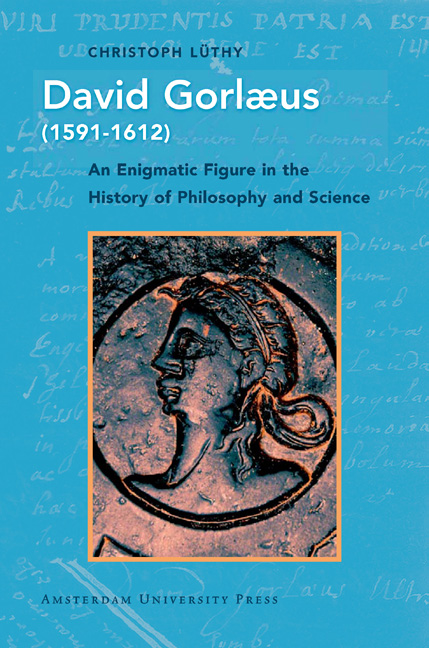Chapter 4 - Gorlæus’ Place in the History of Seventeenth-Century Thought
Published online by Cambridge University Press: 27 January 2021
Summary
Gorlaeus died in the spring of 1612. We do not know where and why he died, nor whether he had been ill for some time before passing away; perhaps he had contracted malaria, as presumably did his father, who also died in 1612. All we have is his tomb and his two posthumous publications, the Exercitationes philosophicae (published in 1620) and the Idea physicae (published in 1651). From the unfinished state of the concluding part of the Exercitationes, we may conclude that Gorlaeus was still working on his longer treatise when he died. One in fact senses that his decision to deviate from his standard type of exposition and to jot down a paraphrase of a number of positions defended in a recent theological disputation at Leiden concerning the origin of the soul and the transmission of evil must have been due to his wish to conclude his manuscript before it was too late.
As we have seen above, the Idea, printed in 1651, contained ideas that were too similar to those expounded in the Exercitationes and appeared too late to elicit much of a reaction. With the Exercitationes, the story is different: it enjoyed, notably between 1620 and 1650, quite a reputation at home and abroad.
Who decided to publish the Exercitationes in 1620, eight years after Gorlaeus’ death, is not clear. After all, by then, Gorlaeus’ parents had also passed away, and Gorlaeus’ aunt and his cousin Carel van Gelder, a lawyer, were taking care of the estate. It might have been Van Gelder, the executioner of the will of David van Goorle, Sr., who had the book published. One could also imagine an involvement of Abraham van Goorle, Jr., David Gorlaeus’ paternal cousin. Jaeger has suggested that Petrus Bertius, the former regent of the Theological College at Leiden as well as a friend of both Arminius and Gorlaeus’ uncle Abraham, may have organized this publication – but we have already seen that there is no evidence to corroborate that claim. What is conspicuous, however, is that whoever it was who edited the work had no interest in revealing himself or his motivations.
- Type
- Chapter
- Information
- David Gorlæus (1591-1612)An Enigmatic Figure in the History of Philosophy and Science, pp. 133 - 162Publisher: Amsterdam University PressPrint publication year: 2012



